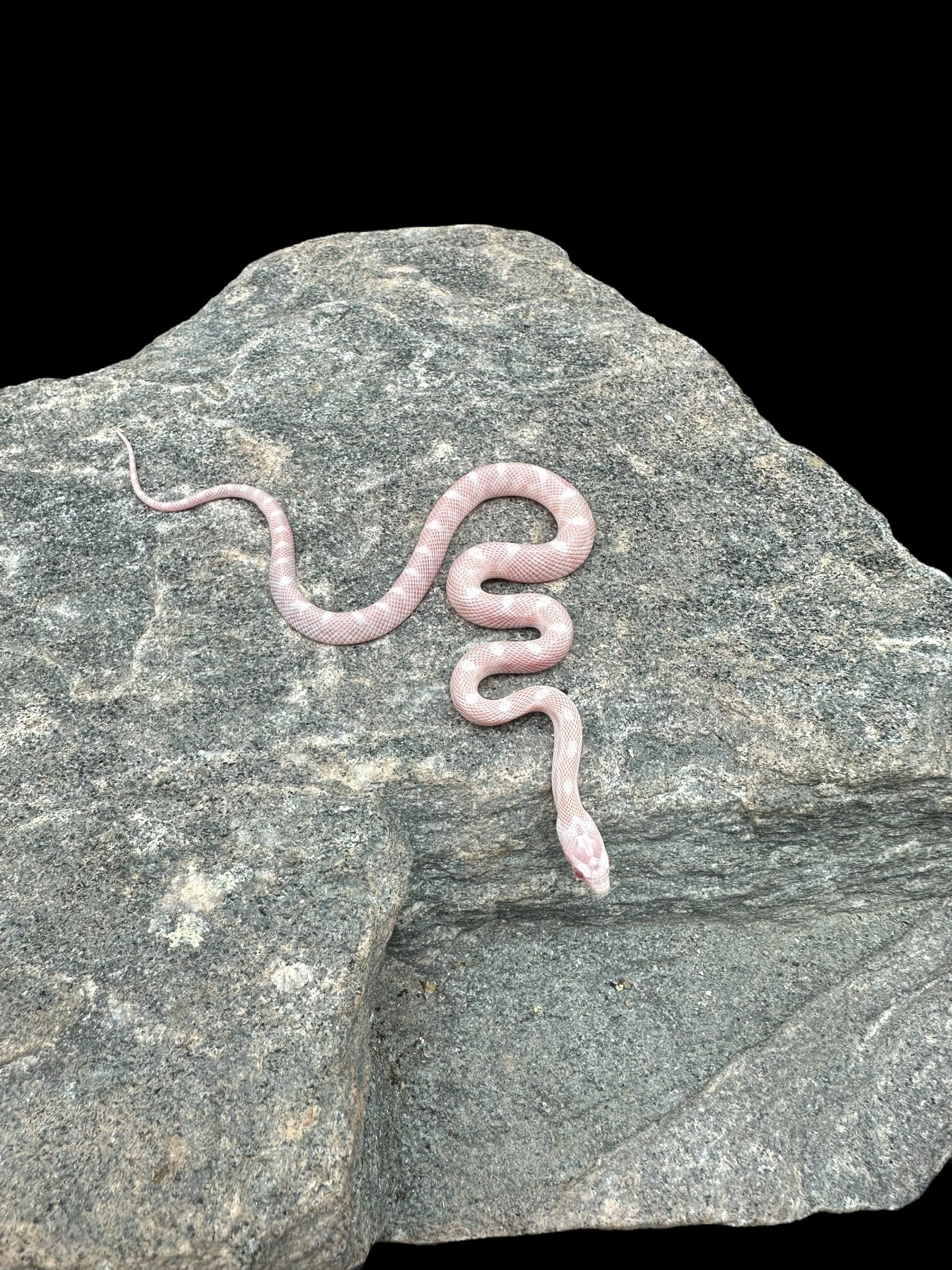Photo Disclaimer
Description
Corn Snake (Peppermint Motley)
Scientific Name: Pantherophis guttatus
Common Name: Corn Snake
Species Overview
Size: Adults typically reach 3–5 feet (0.9–1.5 m) in length, with a slender, agile frame and smooth, glossy scales.
Appearance: The Peppermint Motley Corn Snake is a pale, frosted morph resulting from the combination of Amelanistic (Albino), Diffused (Bloodred), and Motley genes. This Corn Snake displays a soft pink to creamy white base with faint silvery or blush-pink markings that may fade almost entirely with maturity. The Motley gene connects or eliminates dorsal patterning while removing the belly checkering, and the Diffused gene further smooths the body pattern into a clean, gradient-like finish. The eyes are ruby red, a hallmark of the Amelanistic trait. The result is a snake with a delicate, uniform coloration that appears almost pastel in tone—an elegant, visually refined expression of multi-gene interaction.
Distribution: A selectively bred morph of the Corn Snake (P. guttatus), created through the combination of three recessive genes: Amelanistic, Diffused (Bloodred), and Motley.
Habitat: Wild Corn Snakes inhabit forest edges, meadows, and agricultural zones across the southeastern United States. In captivity, they thrive in naturalistic terrariums that provide climbing structures, hiding places, and soft substrate for burrowing.
Behaviour: Corn Snakes are crepuscular, most active during dawn and dusk. They are well-known for being hardy, adaptable, and consistent feeders, which makes them excellent candidates for both display and breeding projects.
Captive Care
Enclosure: A naturalistic 40-gallon terrarium (36” × 18” × 18”) or larger is ideal for adults. A soil-based or bioactive substrate layered with leaf litter encourages natural burrowing and exploration. Provide multiple hides, cork flats, climbing branches, and plant cover for enrichment and security.
Temperature & Humidity: Maintain a daytime gradient of 75–82°F (24–28°C) with a basking area around 86–88°F (30–31°C). Allow nighttime drops to 70°F (21°C). Maintain humidity between 40–60%, with a humid hide available during shedding.
Diet: Offer frozen-thawed rodents every 7–10 days for juveniles and every 10–14 days for adults. Prey size should be roughly 1.25× the width of the snake’s mid-body.
Behaviour in Captivity: Corn Snakes are hardy and adaptable, responding well to stable environmental conditions and consistent feeding schedules. Their natural curiosity makes them engaging, and they thrive in naturalistic setups with visual and spatial variety.
Special Considerations: When paired with other compatible morphs such as Hypomelanistic or Lavender, Peppermint lines can produce offspring with creamier pinks or cooler gray-pink tones. Some bloodlines may develop a nearly patternless white appearance over time, further enhancing their visual simplicity.
Genetics Note
Amelanistic (Recessive)
Removes all dark pigment, producing red, orange, or white coloration with ruby-red eyes.
Diffused / Bloodred (Recessive)
Removes belly checkering and reduces or eliminates dorsal patterning, resulting in smooth, even coloration.
Motley (Recessive)
Removes belly checkering and connects or streamlines dorsal blotches into clean, organized shapes.
Genetic Combination Summary
The Peppermint Motley Corn Snake expresses three recessive traits:
-
Amelanistic = Removes black pigment, resulting in red and white coloration
-
Diffused (Bloodred) = Reduces dorsal and ventral patterning
-
Motley = Removes belly checkering and simplifies dorsal blotches
Together, these genes produce a pale pink-white snake with a clean, frosted appearance. The Peppermint Motley Corn Snake serves as an excellent base for creating future morphs with enhanced pastel tones or near-patternless variations when combined with genes such as Hypo, Lavender, or Scaleless.

